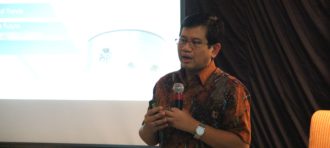CHALLENGES IN STRENGTHENING CORE COMPETENCES IN THE DISRUPTIVE ECONOMY

The global world is now facing a new industrial era that was caused by many factors – automatization, digitalization, and so on – the era that is called “industry revolution 4.0”. However, technology is not the only factor that changes the “game” in the industry.
There are three “game-changing” major factors in the industry nowadays – stimulus policy and shifting energy market, technological innovation and global connectivity, and urbanization and aging. Undeniably, those three factors result in VUCA (volatility, uncertainty, complexity, ambiguity) environment. And disruptive economy is the inevitable result of the VUCA environment.
The VUCA environment gives a massive impact to type of business, as well as the R & D/consulting, production/manufacture, and intermediaries/media. The impact forces the industries to strengthen their core competences in differentiation and added value – the core competence in providing potential access to a wide variety of market, make a significant contribution to the perceived customer benefit of the end products, and difficult to be imitated by competitors.
“At the end, industries have to provide differentiation and added value,” said Aloysius Budi Santoso, the Chief Corporate Human Capital Development of PT Astra International, during the Human Resource (HR) Knowledge Sharing: Core Competence in Disruptive Economy that was held on Thursday, December 15th, 2016, at BINUS JWC Campus, Senayan, Jakarta.
However, according to Budi Santoso, there still are some challenges for Indonesia in facing this inevitable disruptive economy, especially during the ASEAN Economic Community (AEC). Those crucial challenges are national education system improvement, right values and mindset, profession standardization, competitive technical knowledge, and global exposure.
Industrial-wise, some underlying factors for organization in facing the VUCA environment are leadership (have an eye like an eagle but detail like ants), agile organization innovation and speed of execution, and strong culture and engagement.
Leadership plays a crucial role in strengthening core competences in the disruptive economy. There are five leadership competencies for VUCA environment – a leapfrogging mindset, boundary pushing, data intuition integration, adoptive planning, and savoring surprise. A leader also has to be able to create differentiation and can not only rely on helicopter view.
The urgency of these factors becomes more and more important in this global era, an era where there is almost no boundaries in products and human resources flow, as well as disruption. “If we can’t compete globally, our nation and corporation will fail,” said Budi Santoso.
Facing Challenges in the Industry: How did Astra International Do It?
All this time, Astra International has been well-known as one of excellent companies in Indonesia. Budi Santoso revealed that human resource is the key factor and main advantage of Astra International. “It was started from the values that the founding father, William Soeryadjaya, believed in,” he explained.
These values, Budi added, are implemented continuously through a system by professionals that have similar passion and belief. A belief that people are not mere tools, but important assets for Astra International.
According to Budi Santoso, how good a business is, without right people to run it, it will become nothing. “Just like the man behind the gun. The one who decides how well the gun will work is the man,” he said.
Therefore, Astra becomes very comprehensive in developing its human resource, from the first step (recruitment), looks for right people that are suitable with its values, consistently does the mapping, and develops them according to their strengths and weaknesses.
Started from a belief, the people have become the key factor for Astra International in facing challenges in the industry.
(ERON)





